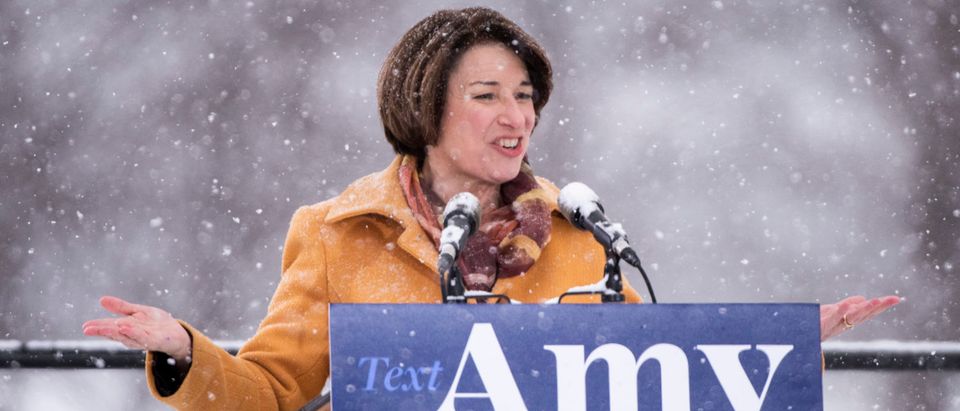The Klobucharge is real. No, that’s not a nonsense word connoting what Dr. Seuss would use as a form of electricity, but the the momentum that Sen. Amy Klobuchar has following strong showings in Iowa and New Hampshire’s Democratic nominating contests. And with her newfound relevance should come newfound scrutiny: Sen. Klobuchar’s tax policy deserves a real look.
Senators Bernie Sanders and Elizabeth Warren have vied for the far-left vote, leading to former Vice President Joe Biden and South Bend Mayor Pete Buttigieg looking “moderate” only by comparison. While they may not be as radical as their populist opponents, the reality is that both Biden and Buttigieg have very liberal policy proposals.
Buttigieg has supported returning the corporate tax rate back to 35 percent, free college for students coming from families earning less than $100,000 per year, and has supported single-payer healthcare in the past (he now supports a watered-down version). Biden, meanwhile, supports raising taxes between $2.3-2.6 trillion and shelling out $1.7 trillion in clean energy boondoggles.
This has led to Klobuchar styling herself as the only true moderate left in the race. That may come as a surprise to those who have witnessed her relatively liberal Senate career, where her voting record earned her low marks from fiscal conservative organizations. Nonetheless, in relation to her primary counterparts, she has taken a much more incremental approach.
The corporate tax rate is a good example. Corporate taxes are a favorite bugaboo of Democratic candidates, who have collectively forgotten that President Obama called for a cut to the corporate tax rate when he was in office. After all, the American corporate tax rate, then at 35 percent, was well above the rest of the developed world, putting American workers and businesses at a competitive disadvantage.
Though the tax reform law cut the corporate tax rate down to 21 percent at the federal level, putting it roughly on par with the EU average, each major candidate in the Democratic field has proposed raising it. Sanders, Buttigieg and Warren have all proposed a 35 percent rate, while Biden and Bloomberg have proposed a 28 percent rate. Though she still proposes an increase, Klobuchar’s proposed 25 percent rate is the smallest tax hike in the field. (It would still be above 30 percent with state and local taxes added.)
Klobuchar has also taken more measured positions on education and healthcare. She supports free community college and expanded Pell Grants, as well as various smaller changes to student aid and tax credits for trade education and apprenticeships. These are fairly mainstream Congressional Democratic proposals, but they’re notable for how they leave out more impractical plans to forgive student debt or make four-year college free.
On healthcare, Klobuchar supports a public option, not single-payer healthcare. This position may anger leftists on Twitter, but it separates her from a Democratic field that is either flirting with or fully married to Medicare for All.
Her voting record in the Senate and her campaign platforms make clear that a Klobuchar administration would be a mainstream liberal one. Her real moderation, however, may be in style and tone. Each candidate in the race has felt the need to plant their flags on a “bold new idea” (that is often “bold” and “new” because others know it’s a bad one). Sanders and Warren are most guilty of this, but they’re not the only ones.
Buttigieg has expressed support for mark-to-market taxes and a 49.9 percent top individual tax rate. Biden supports various progressive gimmicks such as a financial transactions tax and a minimum book tax. Bloomberg has proposed a 5 percent surtax on income above $5 million.
No one would confuse Amy Klobuchar with a fiscal conservative, or even a “Blue Dog Democrat”-style budget hawk. That her lack of radical rhetoric and proposals allows her to claim the moderate lane in a primary simply illustrates just how far left the debate has moved in recent years.
Andrew Wilford is a policy analyst with the National Taxpayers Union Foundation, a nonprofit dedicated to tax policy research and education at all levels of government.


